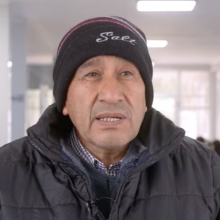Visiting the doctor can be daunting. In Latin America and the Caribbean, this experience often involves more than just confronting personal fears—such as undergoing certain diagnostic tests. It can also bring significant financial strain, particularly for the region’s poorest families. An unexpected health issue, especially a chronic disease, can place a long-term burden on household budgets.
This was the case for Guillermo Frías, a resident of Villa Burruyacú, a small town in northwestern Argentina. During a hospital visit, doctors discovered his high blood sugar levels. Further tests confirmed the diagnosis: diabetes—a condition affecting 9.9% of the region’s population. Fortunately, the treatment turned out to be simpler than Guillermo expected. “After the tests, I was able to get all my treatment at the same center, receive my medications, and learn how to eat healthier”, he explains.
Ensuring that patients like Guillermo can access the medical care they need without financial hardship is a core goal of Plan Sumar, a key initiative of the Argentine government. With World Bank support since 2004, this project has already reached 17.5 million people, providing access to integrated, quality health services.


